MIDDLEBURY, Vt. — A meeting held Monday on “creating a climate economy” revealed that Middlebury residents are concerned about climate change but differ on what to do locally in response.
Compared to the debut of the Vermont Council on Rural Development’s Climate Economy Model Communities Program, which created a stir in Pownal two weeks ago, the second forum in the council’s series was considerably less divisive.
Some local attendees of the meetings held in Pownal since July told True North Reports that VCRD’s program isn’t accountable and comes from outside the local community.
But when it came to the council’s presentations in Middlebury on Monday, residents appeared to be united on the left-leaning politics of climate change, including the view that global warming requires responses at the local level.
But when it came to offering specific ideas about retooling an entire economy to a climate-change model, attendees sounded as confounded as Shinarian workers on a Tower of Babel ziggurat.
VCRD’s purpose for holding public discussions around Vermont is to urge communities to “confront climate change through innovative economic development.” On Monday, that discussion was led in part by Jon Copans, director of VCRD’s Climate Economy program. The various forums were held around town in Middlebury’s new town office building, the Ilsley Public Library, St. Stephens Episcopal Church and Middlebury Union Middle School.
Copans thanked both Selectboard member Laura Asermily and former state Rep. Steve Maier for inviting the group to town to begin the discussion about climate change.
Session topics about creating a so-called climate economy were far flung, and included renewable energy generation, financing, housing, efficiency, neighborhood-scale initiatives, local food, agriculture and health, as well as infrastructure, transportation and business innovation.
Among those residents who spoke, the biggest concerns at the residential level were the high cost of installing solar energy hardware and site-specific barriers, such as the cost of removing shade trees blocking solar panels.
One resident told other attendees he is planning to move in a few years and doesn’t want to make a big investment in residential solar.
“Selling a house with leased solar panels is difficult,” he said. “… Selling a house with leased solar panels may drive down the sales price.”
Another attendee who spoke said energy conservation needed to be part of the conversation.
“There’s no sense of urgency [about climate change],” he said. “Yes, we have incentives like Efficiency Vermont, but we need more to jump start [action].”
Sarah Brock, energy program manager of the non-profit Vital Communities in White River Junction, suggested that Middlebury residents create an effort similar to Solarize Upper Valley.
“This program has involved 23 towns in helping hundreds of Upper Valley homes switch to solar energy,” she said. “This grassroots effort doubled the number of solar homes. We also helped local solar contractors by marketing their services to residents.”
Jennifer Green, sustainability coordinator for the city of Burlington, described how the Burlington Electric Department’s no-charge, online Solar Shopper service puts interested homeowners in touch with alternative energy contractors.
“We vetted several partners who agreed to offer free estimates for solar at your house,” Green said. “Burlington Electric Department screens the estimates on the homeowner’s behalf and then provides an easy-to-compare format. All of BED’s solar partners were chosen based on reputation for customer service, high quality solar technology, and production warranties and guarantees. … That’s what Solar Shopper is all about.”
Dick Thodal, a resident of Middlebury, said he’s “pro-solar” and a do-it-yourselfer when it came to installing his own alternative energy system at home.
“There’s lots of things homeowners can do on their own, starting online,” Thodal said. “For example, check out the PV Watts Calculator website of the National Renewable Energy Lab. My wife and I are in a wildlife habitat group that goes by neighbor-neighbor direct relations; I think this is the best way to go to get more folks to start using alternative energy.”
Former state Rep. Steve Maier, now a member of the board of Addison County Relocalization Network Renewable Energy Co-op, said that confronting climate change at the community level is complex and is often confusing to residents.
The former legislator expressed frustration with the current community organizing approach, at least when it comes to promoting alternative energy use. He wondered aloud how to get more “climate change” thinking into the economic mainstream.
“It’s hard for folks to figure all this out,” Maier said. “We need to simplify how people access resources within a community to [fight climate change] on the local level. … I’m proposing that the current structure we find ourselves is limiting; it’s complex and depends on volunteers. … I’d move away from this model, but it needs to be professionally driven to make it work.”
Copans cautioned attendees that VCRD was not there to provide a “process solution” to all the myriad climate concerns, but to get local folks talking about what to do that works for them locally.
“We’re not sitting here today to come up with a structure to solve all this, but we want to hear ideas,” Copans said. “… We hope a group of people from Middlebury and surrounding areas will come together and really work on this. We’re looking for these folks to reconvene and start working.”
Lou Varricchio is a freelance reporter for True North Reports. Send him news tips at lvinvt@gmx.com.
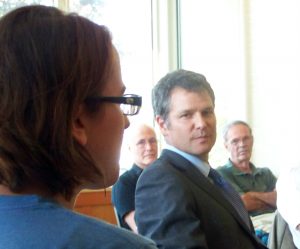
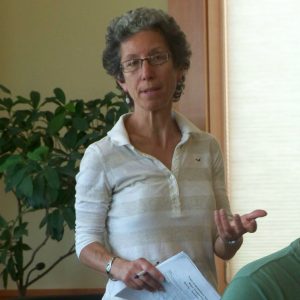
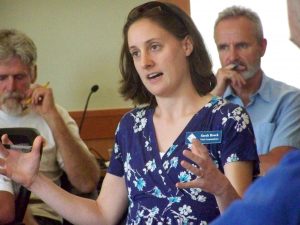
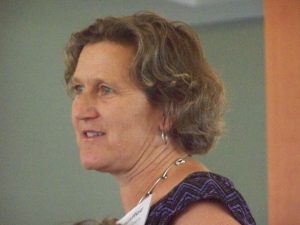
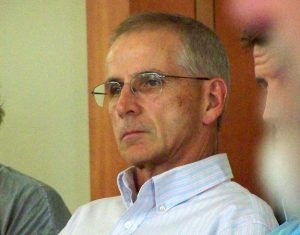



Previously I talked with Bruce, Lou and Michael about adding the referenced URLs to my comments, as they explain my comments in more detail.
Please check with them before deleting URLs.
Thank you.
The idea of creating a “climate economy” in stopping climate change dirtys the reason for fighting climate change. It makes perfect sense and we see it time and time again….those who push the hardest to fight climate change have connections who will roll in the money the rest of us are forced to pony up in the process of making it all happen. You want to fight climate change? Hydro Quebec: Cheap, reliable and stable. The solar panel and wind developers aren’t selling a product that meets these three standards. That’s all we need to know.
Always ask,Qui Bono. Who benefits then follow the money.
The fundamental issue is re-localization is being sold as “fighting climate change” when it is the right thing to do on so many other levels. Why wouldn’t our towns and cities want to invest in infrastructure and business that put money back into the local community? VT already buys 30% of our electricity from HQ so how would buying more improve the local economy? Behind every VT solar and wind project are VT landowners and citizens that are receiving economic benefits, and there are also VT businesses that will greatly benefit from further growing our energy generation infrastructure.
“Cheap, reliable and stable. The solar panel and wind developers aren’t selling a product that meets these three standards.” Totally false. If this were the case, then why is every utility in America investing in these technologies?
Matt,
You have it backwards.
Buying low-cost hydro energy from H-Q would be a bargain compared to producing that energy in Vermont at 2 – 3 times the NE wholesale price.
That is the reason we should buy as much as possible, so we would have money to buy other things, instead of spending it all on expensive locally produced energy.
Justin,
You are correct regarding more hydro from H-Q.
That message of more: – Clean (much cleaner than any other energy source), – Near-zero CO2 (much lower than any other energy source, – Low-cost (much less costly than 500-ft tall wind turbines on pristine ridgelines and solar in open, fertile meadows*) H-Q hydro energy is being drowned out by pro-RE interests that want to saddle Vermonters with expensive locally produced, “artisanal” energy, because it advances THEIR RE business interests.
* About 6-7 cents/kWh, plus 1.0 c/kWh for transmission, adjusted based on NE wholesale prices, which have been 4.5 – 5 c/kWh since 2008.